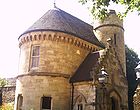
Yorkshire Philosophical Society
Encyclopedia

Charitable organization
A charitable organization is a type of non-profit organization . It differs from other types of NPOs in that it centers on philanthropic goals A charitable organization is a type of non-profit organization (NPO). It differs from other types of NPOs in that it centers on philanthropic goals A...
learned society
Learned society
A learned society is an organization that exists to promote an academic discipline/profession, as well a group of disciplines. Membership may be open to all, may require possession of some qualification, or may be an honor conferred by election, as is the case with the oldest learned societies,...
aimed at promoting the natural sciences, archaeology
Archaeology
Archaeology, or archeology , is the study of human society, primarily through the recovery and analysis of the material culture and environmental data that they have left behind, which includes artifacts, architecture, biofacts and cultural landscapes...
and history
History
History is the discovery, collection, organization, and presentation of information about past events. History can also mean the period of time after writing was invented. Scholars who write about history are called historians...
. The society was formed in York in December 1822 by James Atkinson, William Salmond, Anthony Thorpe and William Vernon.
History
In 1828 the society was given, by royal grant, some of the grounds of St Mary's AbbeySt Mary's Abbey, York
The Abbey of St Mary in York, once the richest abbey in the north of England, is a ruined Benedictine abbey that lies in what are now the Yorkshire Museum Gardens, on a steeply sloping site to the west of York Minster. The original abbey on the site was founded in 1055 and dedicated to Saint Olave...
including the ruins of the abbey. On this land the society constructed a number of buildings including the Yorkshire Museum
Yorkshire Museum
The Yorkshire Museum is a museum in York, England. It is the home of the Cawood sword, and has four permanent collections, covering biology, geology, archaeology and astronomy...
built to house the society's geological and archaeological collections and opened in 1830. Landscape architect
Landscape architect
A landscape architect is a person involved in the planning, design and sometimes direction of a landscape, garden, or distinct space. The professional practice is known as landscape architecture....
Sir John Murray Naysmith was commissioned by the society to create a botanical gardens around the museum during the 1830s.
Organisation
The Yorkshire Philosophical Society is registered charityCharitable organization
A charitable organization is a type of non-profit organization . It differs from other types of NPOs in that it centers on philanthropic goals A charitable organization is a type of non-profit organization (NPO). It differs from other types of NPOs in that it centers on philanthropic goals A...
, and has an open subscription-based membership. The offices and reading room of the YPS are located in Museum Gardens Lodge in York
York
York is a walled city, situated at the confluence of the Rivers Ouse and Foss in North Yorkshire, England. The city has a rich heritage and has provided the backdrop to major political events throughout much of its two millennia of existence...
.
Current activities
The Society holds a series of free public lectures every year covering subjects including science, technology, history, archaeology and geography. Research grants are given by the society in connection with its area of interest and awards are available for archaeology students.Further reading
- Philosophers and Provincials; The Yorkshire Philosophical Society from 1822 to 1844 by A. D. Orange.
- York Observatory. Leaflet about the Observatory in the Museum Gardens, York.
- Mystery at the Rectory: Some Light on John MichellJohn MichellJohn Michell was an English natural philosopher and geologist whose work spanned a wide range of subjects from astronomy to geology, optics, and gravitation. He was both a theorist and an experimenter....
- The Nature of the World: The Yorkshire Philosophical Society 1822–2000 by David Rubinstein

